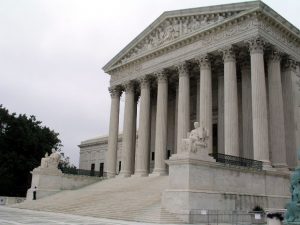Is saying, “Ok, boomer” a form of age discrimination? The U.S. Supreme Court is weighing the possibility. While we await a decision, companies may want to be wary of workers tossing the phrase around. 
The pithy catchphrase went viral last year as a means of taking a dig at older generations – specifically the perception that aging individuals tend to be more judgmental, narrow-minded and rigidly conservative. Recently, while considering an age discrimination lawsuit, Chief Justice John Roberts, himself a baby boomer (those born between 1946 and 1964), asked hypothetically whether use of the phrase said during the hiring process would constitute age discrimination.
The case in question involves an older government employee who alleges she was discriminated against because of her age. When Roberts asked the question, the somber mood within the courtroom lightened as many chuckled. However, the plaintiff’s employment attorney did seize on it to make a serious point, noting that the use of ethnic slurs in the hiring process could easily be construed as evidence of age discrimination – why not a quip like, “Ok, boomer”?
The U.S. Supreme Court isn’t the only government arena in which the phrase has gained purchase. Headlines were made last year when a 25-year-old politician in New Zealand used it to shut down an older member of parliament.
However, it’s believed to have been around since at least 2009, when it was spotted in a Reddit post. It didn’t gain great popularity though until it was used 10 years later in a viral TikTok clip.
The Case That Brought “Ok, Boomer” to the U.S. Supreme Court
The case that brought the phrase to U.S. Supreme Court oral arguments was Babb v. Wilkie, an appeal from the U.S. Court of Appeals for the Eleventh Circuit. In that case, a pharmacist for the U.S. Veterans Affairs Department is arguing that she was denied career advancement due to her gender and her age. She also said she was retaliated against for her previous complaints filed with the U.S. Equal Employment Opportunity Commission.
Of course, as our Los Angeles age discrimination lawyers can explain, most of the time these cases don’t make it all the way to the nation’s highest court. What makes this case more complicated – and worthy of review by the SCOTUS – is that it asks whether federal courts should continue using the current strict standard to prove age discrimination claims against federal agency employers.
There is no question that age discrimination is a real and growing problem, particularly in tech-heavy regions like Silicon Valley. It’s also likely to increase in frequency, as the U.S. labor force share of workers over 55 has risen from 13 percent to 23 percent in the last 20 years. It’s expected to rise to 25.2 percent by 2028. Addressing it is a priority, though some have expressed concern that using a less stringent standard to prove age discrimination might chill free speech.
Lower courts, using the “but-for cause” standard requiring plaintiffs to prove that age discrimination was the deciding factor in the adverse employment action, have ruled all ruled against the worker. Her employment law attorney, however, is asserting that a different standard should be applied under the Age Discrimination in Employment Act. In federal age discrimination cases against private sector employers, discrimination is required to be the proximate cause of the negative action. But laws pertaining to federal agencies specifically require that that they be free from age-based discrimination.
A decision in the case is likely to be handed down later this year.
Contact the employment attorneys at Nassiri Law Group, practicing in Orange County, Riverside and Los Angeles. Call 949-375-4734.
Additional Resources:
Age Discrimination Starts When An Employer Becomes Aware Of An Older Worker’s Age, Jan. 6, 2020, By Patricia Barnes, Forbes.com
 Orange County Employment Lawyers Blog
Orange County Employment Lawyers Blog

